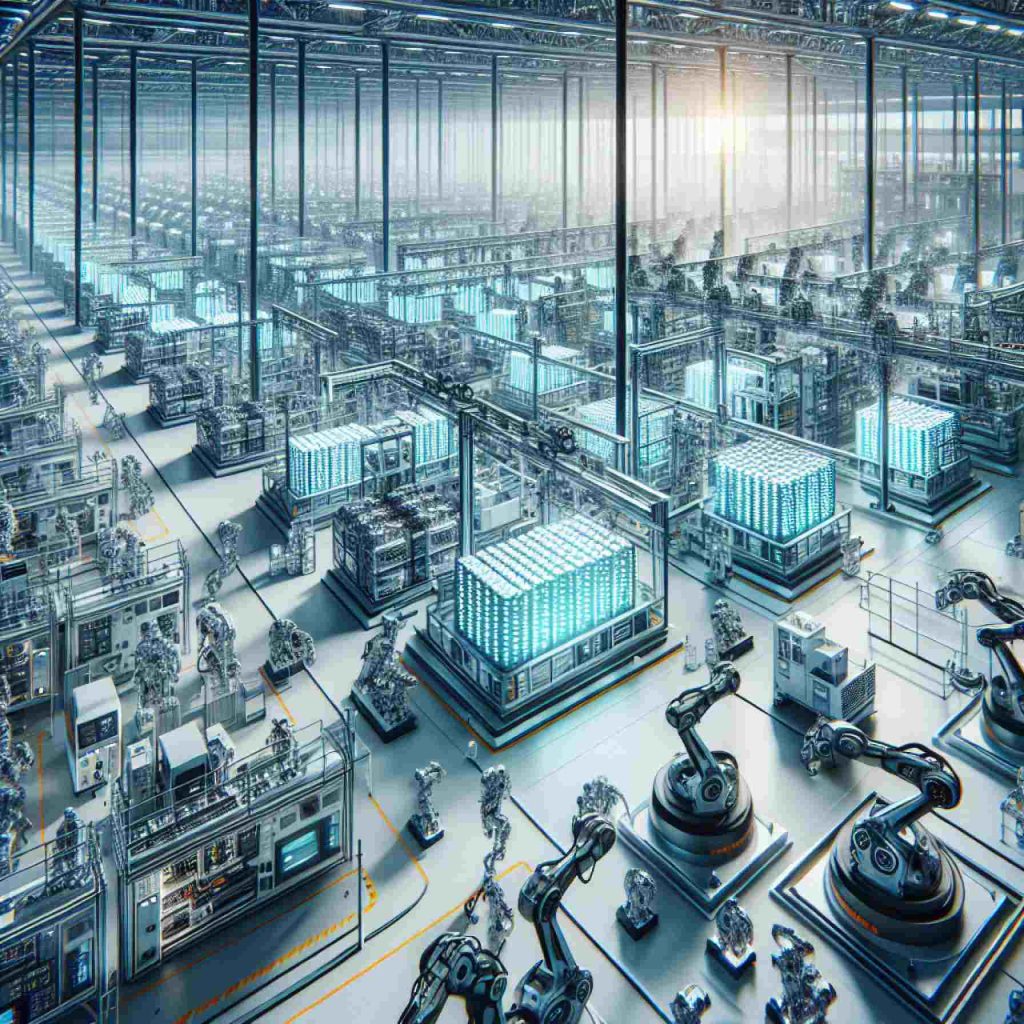- Hyundai’s Mobis India Limited has launched a new EV Battery System Assembly plant in Sriperumbudur, Tamil Nadu, enhancing India’s move towards sustainable mobility.
- The plant spans 8.15 acres and initially accommodates 36,000 battery units annually, with plans to expand to 75,000 units.
- Battery technology at the plant starts with Nickel-Manganese-Cobalt, shifting towards safer, long-lasting Lithium-Iron-Phosphate options.
- This facility supports local employment with 255 new jobs, reinforcing Tamil Nadu’s industrial growth.
- Hyundai’s strategic localization of electric component production combines economic efficiency with environmental responsibility.
- The Hyundai Creta Electric is set to feature battery packs from the new plant, marking a significant step in India’s electric vehicle journey.
A fresh breeze of innovation is sweeping over the vibrant landscape of India’s automotive industry, nestled in the bustling environs of Sriperumbudur, Tamil Nadu. Here, amid swaying palm trees and the hum of industry, stands Mobis India Limited’s newly minted EV Battery System Assembly plant—a beacon of progress in the march towards sustainable mobility.
Sprawled across an expansive 8.15 acres, and strategically positioned beside Hyundai Motor India Limited’s bustling car factory, this plant is more than just a factory—it’s a testament to Hyundai’s commitment to electrifying India’s roads. With its cavernous halls crafted to house an initial capacity of 36,000 battery units per year, the plant straddles the future with grace. And, like a growing organism ready to stretch, it holds the promise to double its capacity to 75,000 units, anticipating India’s surging enthusiasm for electric vehicles.
In the echo of machines whirring to life, you can almost hear the whisper of a greener tomorrow. The inaugural hero of this ambitious project will be the Hyundai Creta Electric, a pathfinder bedecked with battery packs assembled at this new plant. Currently, these batteries are fashioned using Nickel-Manganese-Cobalt—a robust trifecta known for its superior energy density and stability. But soon, the palette of innovation will embrace Lithium-Iron-Phosphate, championing safety and longevity in battery technology.
Beyond the statistics lies a vision of opportunity—the plant is poised to generate an estimated 255 direct and indirect jobs, a boon for local employment and the region’s economic tapestry. Such endeavors are not mere corporate maneuvers but symbiotic dances with the community—a nod to Tamil Nadu’s burgeoning potential as an industrial hub.
In the grand theater of India’s electric revolution, this plant stands as a pivotal player, a concrete declaration of Hyundai’s intent not just to compete, but to lead. It’s a step forward in localizing production, a strategy that dovetails economic efficiency with environmental consciousness. Here, electric components are crafted not only to power vehicles but also to fuel India’s ambitions as a global EV contender.
As the sun sets over Sriperumbudur, casting a golden glow over this cutting-edge facility, there’s a palpable sense of anticipation. Hyundai and Mobis India are not merely constructing a plant—they are crafting a legacy of sustainable innovation, carving out India’s path towards a cleaner, brighter future on electric wheels.
This isn’t just about technology; it’s about a narrative unfolding—one where industry and environment find common ground, where progress rides on electric currents, promising a tomorrow that’s not only closer than ever but perhaps, just around the bend.
The Electrifying Future of India’s Automotive Landscape: All You Need to Know
Overview of Hyundai’s New EV Battery Plant in India
Mobis India Limited’s new EV Battery System Assembly plant in Sriperumbudur, Tamil Nadu, is a significant step in India’s push towards sustainable mobility. This facility spans 8.15 acres and has an initial production capacity of 36,000 battery units per year, with plans to ramp up to 75,000 units. The plant primarily targets the production of battery packs for the Hyundai Creta Electric, using Nickel-Manganese-Cobalt (NMC) technology, with future adoption of Lithium-Iron-Phosphate (LFP) battery technology.
Additional Facts and Features
– Tech Innovations in Battery Chemistry: While NMC batteries offer high energy density and stability, LFP batteries are lauded for their safety profile and longer cycle life, showing Hyundai’s readiness to adopt safer and more sustainable solutions.
– Economic Impact: The plant is expected to create 255 jobs, contributing to local employment and further solidifying Tamil Nadu’s stature as an automotive and industrial hub.
– Sustainable Production Goals: By localizing production, Hyundai not only enhances economic efficiency but also reduces the carbon footprint associated with importing EV components.
Industry Trends and Market Forecasts
1. Growing EV Market: India’s EV market is projected to witness an annual growth rate of more than 40% by 2025, driven by government initiatives, growing environmental awareness, and technological advancements.
2. Government Support: Initiatives such as the Faster Adoption and Manufacturing of Electric Vehicles (FAME) scheme are bolstering the transition to electric mobility in India.
How to Maximize Your Experience
– Transition Smoothly to EVs: Consumers considering EVs can benefit from government subsidies, lower running costs, and an expanding charging infrastructure.
– Understand Charging Options: Familiarize yourself with home charging setups and public charging station locations to ease any range anxiety associated with EVs.
Real-World Use Cases
– Fleet Adoption: Businesses are increasingly adopting EVs for their fleets, benefiting from lower operation costs and contributing to sustainability goals.
– Ride-Sharing Platforms: Platforms like Ola and Uber are gradually integrating more electric vehicles into their fleets in India, which can also help reduce urban pollution levels.
Controversies and Limitations
– Material Sourcing: The use of NMC technology remains under scrutiny for its reliance on cobalt, often linked with unethical mining practices. Companies are investing in R&D to source more ethical materials and recycle battery components effectively.
– Charging Infrastructure: Despite progress, the charging infrastructure in India is still in its nascent stages and requires more investment for widespread adoption.
Security and Sustainability
– Battery Safety: LFP batteries’ potential adoption highlights Hyundai’s commitment to safe and durable EV solutions, minimizing risks of thermal runaway.
– Renewable Energy Integration: Integrating renewable energy sources into the plant’s energy usage can further enhance sustainability.
Quick Tips for Consumers
– Stay Informed: Keep up with the latest EV technologies and government schemes that could make the switch to electric vehicles more advantageous.
– Evaluate EV Models: Compare different models based on range, battery life, cost-efficiency, and after-sales service.
Conclusion
Hyundai’s commitment to advancing electric mobility in India is clear through strategic investments like the new battery assembly plant. Such initiatives not only promise cleaner travel options but can also stimulate regional economic growth and job creation.
For more information about electric vehicles, visit the Hyundai and Mobis websites.










More Stories
Boise Housing Surge: Price Hikes, Rental Demand & Analyst Insights
Satellite Imagery Insights: Core Principles, Key Uses, and Emerging Trends
Leading Web Browsers: Features, Security, Market Share & Performance Insights